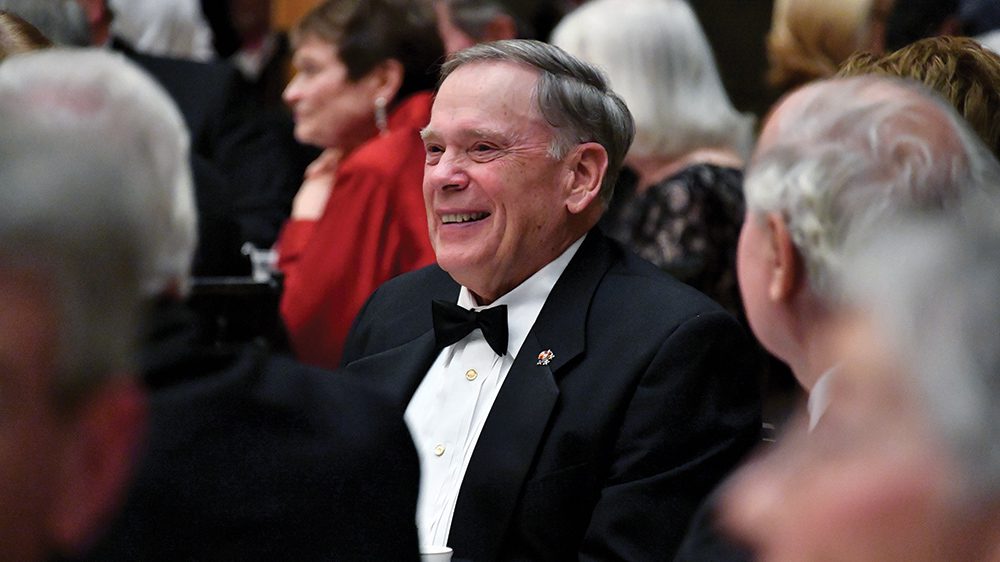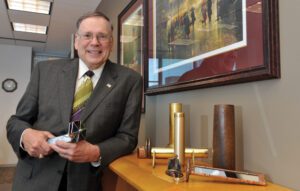Jumper ’66: Defining a Legacy

Retired U.S. Air Force Gen. John Jumper ’66 attends the Institute Society Dinner Nov. 11, 2018.—VMI Photo by Kelly Nye.

Retired U.S. Air Force Gen. John Jumper ’66 attends the Institute Society Dinner Nov. 11, 2018.—VMI Photo by Kelly Nye.
“General Peay’s legacy is permanently stamped here on the Institute. The permanence of the Peay Endowment will reflect the permanence of his impact here at VMI.”
That’s what retired U.S. Air Force Gen. John Jumper ’66, chair of the Peay Endowment for Academic Excellence, has to say about the critical importance of the Peay Endowment, which was established by the VMI Board of Visitors in 2017 to strengthen the Institute’s academic program and commemorate the long and illustrious tenure of retired U.S. Army Gen. J.H. Binford Peay III ’62, superintendent emeritus and the Institute’s 14th superintendent.
As expressed by the Board of Visitors resolution, the Peay Endowment consists of three pillars: Full, merit-based scholarships for cadets; endowed chairs for faculty; and funding for graduate studies for cadets and alumni interested in pursuing a career in academia, with the expectation that they will return to VMI to teach.
As of spring 2023, all three areas are flourishing, with four Peay Scholars receiving scholarships that cover the full cost of attendance at VMI, seven faculty members holding endowed chairs, and three young alumni selected to receive stipends toward the cost of graduate study. Thanks to the generosity of hundreds of members of the VMI family, the endowment, which the VMI Foundation manages, currently stands at $58 million.
Planning for an initiative commemorating Peay’s time as superintendent began in 2015 and 2016, Jumper explained, with the late Donald “Donny” Wilkinson ’61 leading the way. Wilkinson, who served the Institute in many capacities, including terms on the Board of Visitors and the Jackson-Hope Board, led the Institute’s most recent major capital campaign, An Uncommon Purpose, which raised approximately $345 million by the time of its conclusion in 2017. Jumper, former chief of staff of the U.S. Air Force, was not only president of the VMI Board of Visitors during that time but also served as vice chair of the campaign and thus worked closely with Wilkinson.
At the conclusion of An Uncommon Purpose, Wilkinson turned his attention to honoring Peay, and according to Jumper, Wilkinson’s thoughts were inclined toward establishing a scholarship program similar to the Jefferson Scholars program at the University of Virginia.
“We already had a merit scholarship program at VMI,” Jumper stated. “But [Wilkinson] wanted to sort of supercharge that idea by adding criteria specifically reflecting the leadership and character of General Peay.”
Endowed chairs, which bolster compensation and thus help with faculty retention, were also already a part of the Institute landscape, but the fellowships to encourage graduate study were new, and efforts to bring more alumni back to VMI as faculty members were underway even before the Peay Endowment was established.
Following Wilkinson’s death in April 2020, Jumper became chair of the Peay Endowment Cabinet, and he now leads the 12 alumni members of that cabinet charged with overseeing the endowment. For Jumper, the endowment is a way to secure VMI’s standing as one of the nation’s top-tier public institutions and honor Peay, whose transformative leadership ushered VMI into the 21st century with an ambitious building program and an academic renaissance.
Although their cadetships did not overlap, Jumper met Peay decades ago in the Middle East while Peay was commander of the U.S. Central Command and Jumper was his air component commander. The two were friends long before Peay became superintendent in 2003.

Retired U.S. Air Force Gen. John Jumper ’66, former Air Force chief of staff and Peay Endowment cabinet chair, sees the Peay Endowment as a transformational force in VMI’s future.—VMI Alumni Agencies file photo.
“I’ve always admired [Peay] as one of one of our great leaders—not only in the United States Army, but as a national leader—and a great American and, of course, putting all of that to work here at VMI for 17 years,” said Jumper. “All who fully appreciate the value of leaders that VMI delivers to the Commonwealth and to the nation must celebrate General Peay as the engine of VMI’s promise. We owe it to future generations to embrace that promise.”
“It’s most heartwarming to me to see how grateful Peay is for those who support him in this regard and how gratified he is to see programs like the fellowship program, in particular, where we are creating an avenue for cadets and recent graduates who want to pursue a career in academia that are willing to come back to VMI in the future as part of the faculty,” Jumper continued.
As he leads the Peay Endowment cabinet, Jumper is cognizant that the Peay Endowment will create an even brighter future for the Institute—and he’s excited about what that will look like.
“When this is going and fully funded, I think we’ll have the resources for a very, very high class of scholarships,” he stated. “I think we will compete favorably with the [service] academies and the Ivy League schools for the most talented applicants by offering virtually full scholarships to VMI. The chairs, of course, I think, will benefit from having selection criteria that are, again, based on the high values and the example that General Peay set with his entire life.”
And while Jumper unquestionably supports all three pillars of the Peay Endowment, he feels particularly strongly about the importance of bringing alumni back to teach, as they not only understand what it means to be a cadet but also lend better understanding of the VMI system.
“Getting VMI alumni back into the faculty, I think, helps us remain dedicated to the military part of VMI,” he stated. “And it helps the overall faculty be supportive of those class systems and regimental systems … [and] the Honor Code, which is the basis of the VMI system.
“All of those things that you don’t find in other colleges, especially a strict honor code, I think are better understood if you have meaningful representation on the faculty in all the departments that promote a better understanding of the value proposition inherent in the VMI system.”
Donors to the Peay Endowment, Jumper stated, are continuing Peay’s unparalleled legacy of selfless service and unprecedented leadership at VMI.
“I think that it’s important for everyone to appreciate this opportunity with the Peay Endowment to honor the leadership legacy of our former superintendent, ever mindful of the greater good so dear to him—and important for our nation—and rising above the passions of our internal differences, define a legacy that must endure as the soul of VMI.”

The development writer plays a key role in producing advancement communications. This role imagines, creates, and produces a variety of written communication to inspire donors to make gifts benefiting VMI. Utilizing journalistic features and storytelling, the development writer will produce content for areas such as Annual Giving, stewardship, and gift planning.